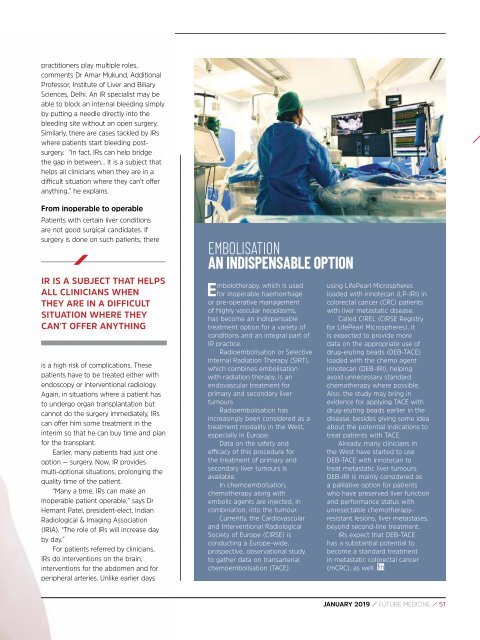FM JANUARY 2019 - digital edition
Create successful ePaper yourself
Turn your PDF publications into a flip-book with our unique Google optimized e-Paper software.
practitioners play multiple roles,<br />
comments Dr Amar Mukund, Additional<br />
Professor, Institute of Liver and Biliary<br />
Sciences, Delhi. An IR specialist may be<br />
able to block an internal bleeding simply<br />
by putting a needle directly into the<br />
bleeding site without an open surgery.<br />
Similarly, there are cases tackled by IRs<br />
where patients start bleeding postsurgery.<br />
“In fact, IRs can help bridge<br />
the gap in between... It is a subject that<br />
helps all clinicians when they are in a<br />
difficult situation where they can’t offer<br />
anything,” he explains.<br />
From inoperable to operable<br />
Patients with certain liver conditions<br />
are not good surgical candidates. If<br />
surgery is done on such patients, there<br />
IR IS A SUBJECT THAT HELPS<br />
ALL CLINICIANS WHEN<br />
THEY ARE IN A DIFFICULT<br />
SITUATION WHERE THEY<br />
CAN’T OFFER ANYTHING<br />
is a high risk of complications. These<br />
patients have to be treated either with<br />
endoscopy or interventional radiology.<br />
Again, in situations where a patient has<br />
to undergo organ transplantation but<br />
cannot do the surgery immediately, IRs<br />
can offer him some treatment in the<br />
interim so that he can buy time and plan<br />
for the transplant.<br />
Earlier, many patients had just one<br />
option — surgery. Now, IR provides<br />
multi-optional situations, prolonging the<br />
quality time of the patient.<br />
“Many a time, IRs can make an<br />
inoperable patient operable,” says Dr<br />
Hemant Patel, president-elect, Indian<br />
Radiological & Imaging Association<br />
(IRIA). “The role of IRs will increase day<br />
by day.”<br />
For patients referred by clinicians,<br />
IRs do interventions on the brain,<br />
interventions for the abdomen and for<br />
peripheral arteries. Unlike earlier days<br />
EMBOLISATION<br />
AN INDISPENSABLE OPTION<br />
Embolotherapy, which is used<br />
for inoperable haemorrhage<br />
or pre-operative management<br />
of highly vascular neoplasms,<br />
has become an indispensable<br />
treatment option for a variety of<br />
conditions and an integral part of<br />
IR practice.<br />
Radioembolisation or Selective<br />
Internal Radiation Therapy (SIRT),<br />
which combines embolisation<br />
with radiation therapy, is an<br />
endovascular treatment for<br />
primary and secondary liver<br />
tumours<br />
Radioembolisation has<br />
increasingly been considered as a<br />
treatment modality in the West,<br />
especially in Europe.<br />
Data on the safety and<br />
efficacy of this procedure for<br />
the treatment of primary and<br />
secondary liver tumours is<br />
available.<br />
In chemoembolsation,<br />
chemotherapy along with<br />
embolic agents are injected, in<br />
combination, into the tumour.<br />
Currently, the Cardiovascular<br />
and Interventional Radiological<br />
Society of Europe (CIRSE) is<br />
conducting a Europe-wide,<br />
prospective, observational study<br />
to gather data on transarterial<br />
chemoembolisation (TACE)<br />
using LifePearl Microspheres<br />
loaded with irinotecan (LP-IRI) in<br />
colorectal cancer (CRC) patients<br />
with liver metastatic disease.<br />
Called CIREL (CIRSE Registry<br />
for LifePearl Microspheres), it<br />
is expected to provide more<br />
data on the appropriate use of<br />
drug-eluting beads (DEB-TACE)<br />
loaded with the chemo agent<br />
irinotecan (DEB-IRI), helping<br />
avoid unnecessary standard<br />
chemotherapy where possible.<br />
Also, the study may bring in<br />
evidence for applying TACE with<br />
drug-eluting beads earlier in the<br />
disease, besides giving some idea<br />
about the potential indications to<br />
treat patients with TACE.<br />
Already, many clinicians in<br />
the West have started to use<br />
DEB-TACE with irinotecan to<br />
treat metastatic liver tumours.<br />
DEB-IRI is mainly considered as<br />
a palliative option for patients<br />
who have preserved liver function<br />
and performance status with<br />
unresectable chemotherapyresistant<br />
lesions, liver metastases,<br />
beyond second-line treatment.<br />
IRs expect that DEB-TACE<br />
has a substantial potential to<br />
become a standard treatment<br />
in metastatic colorectal cancer<br />
(mCRC), as well.<br />
<strong>JANUARY</strong> <strong>2019</strong> / FUTURE MEDICINE / 51


















